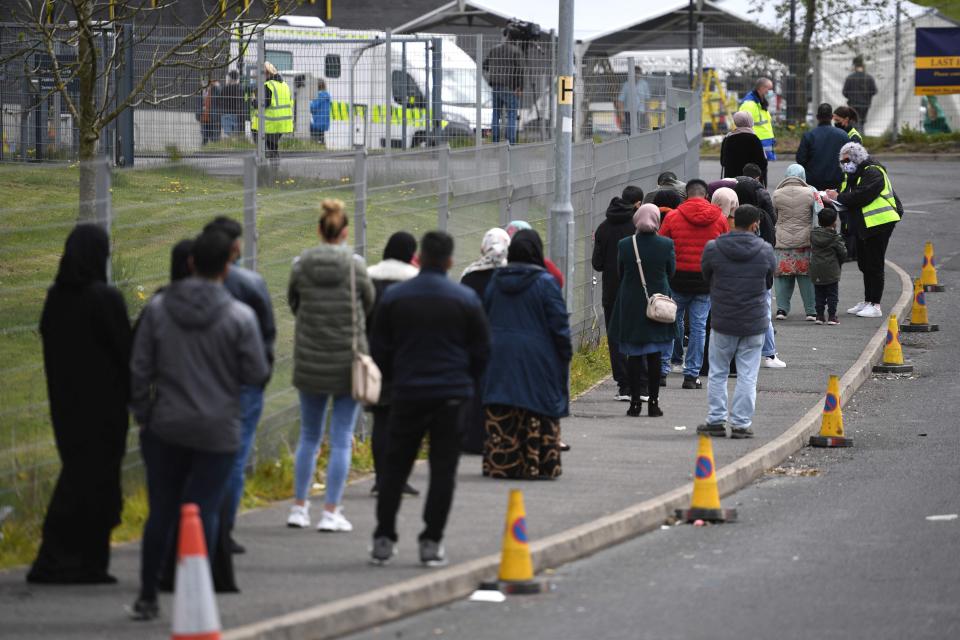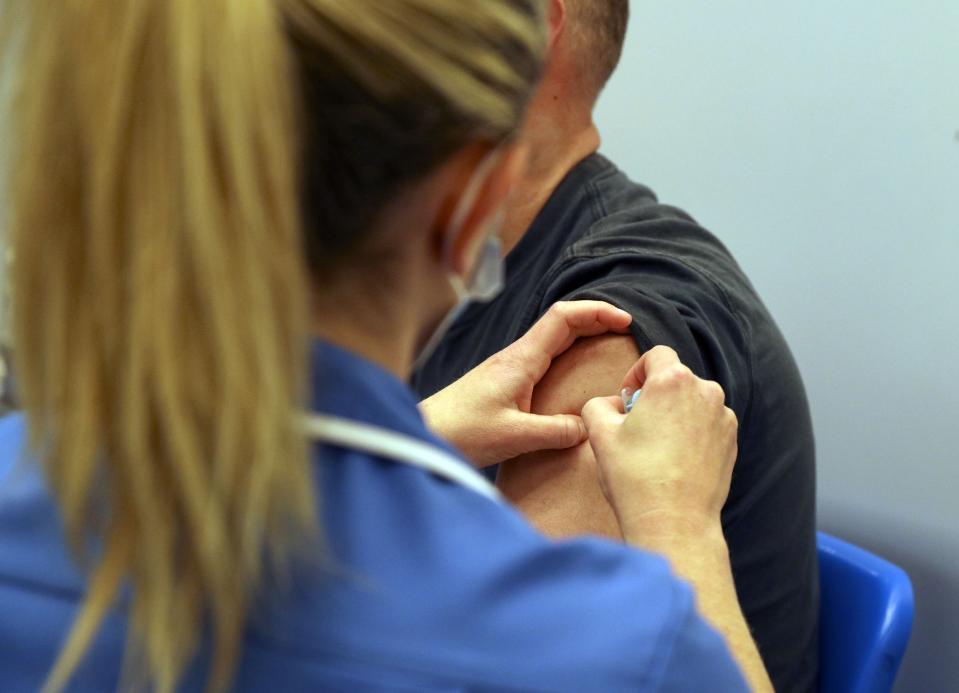Indian variant UK: All you need to know about the Covid variant

The Indian Covid variant has caused growing concern in the UK where cases almost doubled in a week.
Official data on Friday revealed that four Brits have died in the UK after contracting the mutant strain.
Cases of the Indian variant, also known as the B16172 strain, rose from 520 last week to more than 1,300 as of May 12.
In a press conference on Friday, Prime Minister Boris Johnson warned the Indian coronavirus variant could “pose a serious disruption” to plans to ease restrictions and “could make it more difficult” to end them as hoped in June.
Mr Johnson has said that remaining second doses for the over-50s will be accelerated so they come eight weeks after the first.
He added: “We will also prioritise first doses for anyone eligible who has not yet come forward including the over 40s.”
Earlier in the week, Government ministers said they cannot rule out imposing local restrictions to tackle the spread and surge testing is underway in areas of concern.
Health Secretary Matt Hancock said the situation was being monitored carefully and the Government “will not hesitate to take further action if necessary”.
Here is what you need to know about the new variant.
How many cases of the Indian Covid variant are there in the UK?

There are 1,313 confirmed cases of the Indian Covid variant in the UK, according to the latest figures on May 14.
Four people have died from the strain in the UK.
Cases are spread across the country, with the majority in the North West, mainly in Bolton, Sefton in Merseyside, Blackburn in Lancashire, and London.
What is being done by Boris Johnson?
The Prime Minister held a Downing Street press conference at 5.30pm on May 14.
In it, Mr Johnson has said that remaining second doses for the over-50s will be accelerated so they come eight weeks after the first.
The Prime Minister told the Downing Street press conference: “I believe we should trust in our vaccines to protect the public whilst monitoring the situation as it develops very closely because the race between our vaccination programme and the virus may be about to become a great deal tighter and it’s more important than ever therefore that people get the protection of a second dose.
“So following advice from the Joint Committee on Vaccination and Immunisation we will accelerate remaining second doses to the over-50s and those clinically vulnerable right across the country so those doses come just eight weeks after the first dose.”
Mr Johnson added: “We will also prioritise first doses for anyone eligible who has not yet come forward including the over 40s.”
The PM said the army would be deployed on the streets of Blackburn and Bolton handing out tests to help the surge testing efforts.
There will also be an acceleration of the vaccine rollout there, including longer opening hours at vaccination centres.
“If you’re seeing loved ones, think really carefully about the risk to them, especially if they haven’t had that second dose or if it hasn’t yet had time to take full effect,” he said.
Mr Johnson also urged people to “think twice” ahead of travelling to areas with higher incidences of the Indian variant and staying with family and friends within those areas.
The Prime Minister told the Downing Street press conference: “I would urge people just to think twice about that.
“We want people in those areas to recognise that there is extra risk, an extra threat of disruption to progress caused by this new variant and just to exercise their discretion and judgment in a way I’m sure that they have been throughout this pandemic.”
Is the variant likely to derail the easing of restrictions?
The Prime Minister warned the Indian coronavirus variant could “pose a serious disruption” to plans to ease restrictions as hoped.
“I do not believe that we need, on the present evidence, to delay our road map and we will proceed with our plan to move to step three in England from Monday,” he said.
“But I have to level with you that this new variant could pose a serious disruption to our progress and could make it more difficult to move to step four in June.”
But he said he does not think it is “impossible” to go ahead with step four of the road map to easing coronavirus restrictions.
The Prime Minister said: “This doesn’t mean that it’s impossible that we will be able to go ahead with step four.
“I don’t think that’s the case at all. But it does now mean there’s the risk of disruption and delay, and delay to that ambition, and we have to be utterly realistic about that.”
Mr Johnson said that if the Indian variant proves to be “significantly more transmissible” than other strains “we’re likely to face some hard choices”.
He said: “I’m told that if it is only marginally more transmissible we can continue more or less as planned but if the variant is significantly more transmissible we’re likely to face some hard choices.”
But he said there is “no evidence to suggest that our vaccines will be less effective in protecting people against severe illness and hospitalisation”
Does AstraZeneca vaccine work on Indian variant among other jabs?
At present, there is no evidence the Indian Covid variant is resistant to current vaccines such as the AstraZeneca and Pfizer jab.
Although considered more transmissible, it does not feature the mutation found in the South African variant which could help the virus evade a person’s immune system and may affect how well coronavirus vaccines work.
Viral expert Professor Robert Dingwall said: “This variant seems to be better managed by the vaccines than the South African variant so that vaccinated people have only a very low risk of infection that is likely to be mild.”

Will bringing forward second jabs help beat the Indian variant in UK?
When the national vaccine programme began in the UK, officials took the bold decision to delay administering booster shots so that more elderly and vulnerable people could more quickly receive their first shots.
Studies have since shown that giving the second dose 12 weeks after the first, instead of 21 days, can produce a stronger immune response.
Thus it remains to be seen whether bringing forward the date of the second dose could help curb rising infections.
Paul Hunter, professor in medicine at the University of East Anglia, said “surge vaccination” will “possibly” work, but it is “not an easy question either way”.
He told BBC Radio 4’s Today programme: “One of the difficulties with vaccination is that it does take a couple of weeks to work... So it’s not an easy question either way, to be honest.”
Should we have closed our borders to India earlier?
The PM defended not closing the UK’s borders to India sooner, saying that between March and April the South Africa variant was of greater concern than the India variant.
“Don’t forget everyone coming from India, or indeed anywhere else, had to face very tough quarantine rules,” he added.
“We are concerned about this variant and we do think, I think, that it certainly may cause disruption to our attempts to continue down the road map, but they don’t at the moment, change the assessment about about (the next) step.”
The PM said that even in Bolton the NHS was not seeing an increase in hospital admissions and the level of hospitalisations across the country remains “quite flat”.
“What we’re saying is that the public needs to be aware of this barrier to particularly in areas where it is more prevalent,” he said.
Mr Johnson said that the UK would have to see how the transmissibility of the India variant “pans out”.
“We will react as soon as we can see clear and unambiguous data about this, and we will do whatever it takes to protect the people in this country,” he said.
Is the Indian Covid variant driving the second wave in India?
Following the new variant of coronavirus in India, the country recorded 4,000 deaths and 343,144 new Covid cases over the last 24 hours on Thursday.
Scientists believe the Indian variant may be more transmissible than the UK variant which was first detected in Kent last year, and may be linked to the second wave in the country.
Prof Dingwall said that while it may be capable of becoming the dominant strain in the UK, the risk of a surge in deaths or hospital admissions remains low.
He added: “The consequence of this would be a greater number of mild illnesses with little risk of a surge in hospitalisations or deaths.”
What other variants of concern have been identified in the UK?
All viruses undergo small genetic changes as they make copies of themselves in the host.
Most of these mutations are harmless but some can make the disease more infectious or threatening, and evade protection gained through infection or vaccination.
PHE has designated the UK, South Africa and Brazil variants as being “of concern”.
Current vaccines have been designed for earlier versions of coronavirus. Scientists believe they should still work, but may be less effective.
However, experts are confident existing vaccines can be tweaked to better tackle emerging mutations.
The UK Government has a deal with biopharmaceutical company CureVac to develop vaccines against future variants, and has pre-ordered 50 million doses.
Read More
Fantastic opportunities for farmers in Australia free-trade deal, PM suggests
Gove challenged over whether UK Government will allow indyref2 to take place
Sefcovic and Frost invited to give evidence to Stormont committee

 Yahoo Finance
Yahoo Finance 